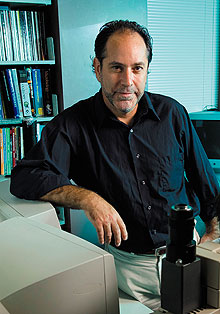  |
| HOME | THIS ISSUE | CALENDAR | GRANTS | BACK ISSUES | < BACK | NEXT > |
Researcher exploring strategies for preventing colon cancerby Chris DeFrancesco - November 17, 2008
|
||||
| Daniel Rosenberg is trying to figure out why some early colon lesions are suppressed by non-steroidal anti-inflammatory therapy, while others seem to thrive under similar conditions. His research has drawn the attention of the National Cancer Institute (NCI), which awarded Rosenberg a $1.8 million grant and identified his work as an “exemplar of NCI-funded translational research.” The Institute invited him to speak about his research at its Translational Science Meeting in Washington, D.C., Nov. 7-9. Rosenberg is a professor of medicine and genetics and developmental biology, an investigator in the Center for Molecular Medicine, and co-director of the Colon Cancer Prevention Program at the UConn Health Center. Early colon lesions and adenomas — or benign tumors — eventually can become cancerous, but they can be identified and removed during a colonoscopy. Rosenberg’s research is focusing on another strategy to prevent development of colon cancer: inhibiting the proliferation of precancerous lesions with what are known as chemoprevention agents. “There are all kinds of chemoprevention agents of potential use that are out there,” Rosenberg says. “Things like red wine and grapes, raspberries, black raspberries, blueberries, and strawberries have components in them that are antioxidants that may be chemopreventive. Green tea and garlic, all these are things that probably have active chemicals in them that are very effective at suppressing cancer, but are natural products and therefore generally nontoxic.” Non-steroidal anti-inflammatory drugs, or NSAIDs, are another category of chemoprevention agents. In addition to commonly used aspirin, they include drugs such as celecoxib (sold under the trade name Celebrex), and sulindac (Clinoril). Variable response This work is a continuation of a study published in the December 2007 issue of the journal Proteomics. Rosenberg, and Health Center colleagues Antoine Menoret, Anthony Vella, Glenn Belinsky, and Masako Nakanishi, analyzed biopsy specimens using proteomics, a high-tech process of studying protein structure and function. The specimens were taken from precancerous lesions in animal models that were administered sulindac intervention for two weeks.
“We were able to actually identify specific protein alterations that occurred in that adenoma before and then after drug treatment,” Rosenberg says. “The only way you would see a difference is if you did a proteomic analysis to identify what we call post-translational modifications, which are changes that occur in a protein specifically. We can see this change occurring from sulindac.” The plan is to eventually move the research into the human trial stage at the Health Center, in collaboration with Drs. Joe Anderson, Petr Protiva, and Bruce Brenner. “Hopefully we’re going to have adenomas that respond to drug treatment, and adenomas that don’t respond,” Rosenberg says. “That’s the key, to try to understand what makes them responsive or nonresponsive. Because if you’re going to place a person on a chemoprevention trial, you want to have an idea that they’re going to respond to it and not end up being worse off. It’s the key to implementing ‘personalized’ medicine.” On the Net: http://cmm.uchc.edu/rosenberg.html http://grad.uchc.edu/phdfaculty/rosenberg.html http://cancer.uchc.edu/patients_families/programs/colon.html http://www.medicinenet.com/sulindac/article.htm http://www.medicinenet.com/celecoxib/article.htm
|
| ADVANCE HOME |

